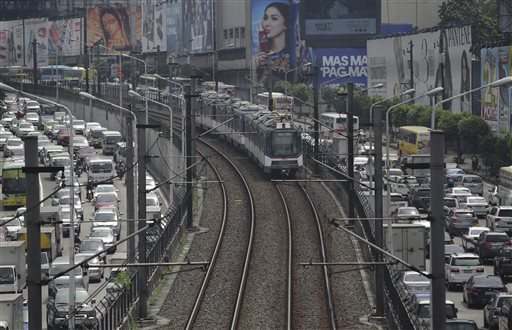NEDA: Bulk of infra projects to be financed by local borrowings

Some of the major infrastructure projects eyed by the Duterte Administration are meant to make travel and commuting in Metro Manila convenient and ease traffic. AP FILE PHOTO
MANILA — The government plans to source from domestic sources two-thirds of the financing for the massive infrastructure projects to be rolled out in the next six years, while state planning agency National Economic and Development Authority has clarified the administration is not abandoning private sector as well as foreign financing.
At a forum organized by the Management Association of the Philippines, NEDA Undersecretary Rolando G. Tungpalan said on Tuesday that of the P7.125-trillion investment target under the 2017-2022 Public Investment Program, 66 percent or P4.705 trillion would be locally financed projects.
To be funded through public-private partnership (PPP) is the P1.27-trillion worth of infrastructure projects or 18 percent of the total, while official development assistance from development partners and donors will finance P1.101 trillion or 15 percent of projects in the pipeline.
Tungpalan said that despite more reliance on domestic borrowings, both ODA and PPP financing would still play a role in the Duterte administration’s “build, build, build” thrust, although more projects would likely be funded by ODA.
Economic managers had said the Duterte administration during its first six months in office already secured almost P1 trillion in ODA from China and Japan.
“In the Philippine Development Plan [PDP] 2017-2022, the government continues to recognize the important role of the private sector through the PPP program, where appropriate. In fact, the PDP clearly states that the investment program of the government for infrastructure projects will be based on, and I quote: an optimal mix of government domestic financing, official development assistance, and private capital,” Tungpalan said.
“Even broadly, we have always maintained that the private sector is the engine of growth, and thus PPP must be seen not in the narrow sense of the BOT [Build-Operate-Transfer] Law, but the broader public-private sector engagement in development,” Tungpalan added.
However, Tungpalan noted that from 2010 to 2016, 14 of the 28 NEDA Board-approved PPP projects were yet to be implemented or discontinued or terminated.
“Noting the delays that have been encountered in the actual mobilization of PPP projects does not mean that infrastructure spending through PPP will not be promoted. Rather, greater focus is now given to addressing the bottlenecks in PPP planning and implementation, so as to fully realize and take advantage of the benefits of PPP in terms of tapping the private sector’s efficiency and innovativeness,” according to Tungpalan.
As for ODA, Tungpalan pointed out that such financing scheme provides “longer-term maturity and favorable concessional financing terms, with grant element of at least 25 percent as provided for in our own ODA Act” as well as “a wider access to knowledge, experience and technology.”
“As we all know, many large infrastructure projects will require long-term financing, especially if these have long gestation period. ODA accessed by government has favorable financing terms that match the needs of such infrastructure projects better than commercial sources of our grants,” Tungpalan said.
While “concerns have been raised on whether ODA financing is sustainable and supportive of local growth and development, particularly, as foreign borrowing could expose us to undue foreign exchange risks and a serious debt burden that would imperil our strong macroeconomic stability, and therefore sustainable growth,” Tungpalan noted that “over the last six years, debt-to-GDP ratio has improved from 52 percent of GDP in 2010 to 45 percent of GDP in 2015.”
“While government has decided to increase its deficit to 3 percent of GDP under the current plan, the deficit will be financed largely by local borrowing at 80:20 ratio in favor of domestic borrowing. With the expected growth in GDP, expanding by more than 1.5 times by the end of the plan period, government’s debt is expected to decline from 42.7 percent of GDP in 2016 to 40.9 percent of GDP in 2017 and to 35.4 percent of GDP in 2022,” Tungplan added.
According to Tungpalan, “the specific decisions in recent times to change the mode of implementation from PPP to ODA if not [sourcing from the national budget] of some projects do not constitute a ‘shift in policy from PPP to ODA.’”
“On the other hand, implementation through ODA under the financing strategy administered by the Department of Finance, as well as agreement with our ODA partners to speed up processes without compromising quality, enable us to have greater control over the quality and timeliness of project implementation,” the Neda official said.
“As we gear up to improving further the quality of project preparation and implementation, we are confident that the programmed financing and implementation arrangement of our medium-term infrastructure program will be realized, consistent with sound macroeconomic fundamentals… It’s not whether it’s ODA or PPP: good quality at entry, implementation, and operations and maintenance should be matched with good governance to produce good sustainable results,” he added. SFM
